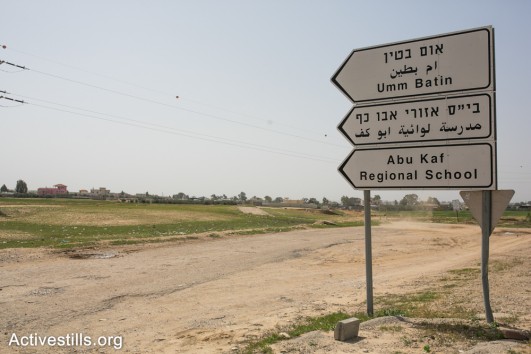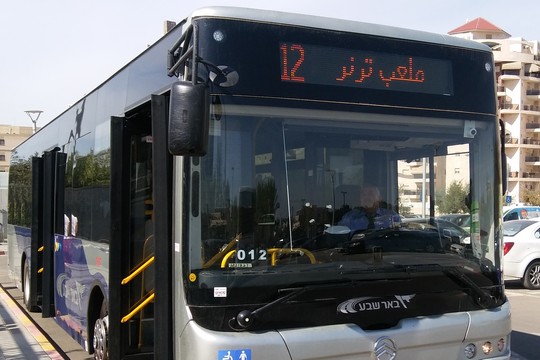The sudden and unannounced removal of a Bedouin village’s only bus stop, by Israel’s Transport Ministry, has placed the community under de facto closure.
By John Brown*

The residents of Umm Batin, a Bedouin village in the south of Israel, were surprised to discover at the beginning of December that the bus stop they use to get to nearby Be’er Sheva had disappeared without warning or explanation.
When village residents asked bus drivers — after catching the bus from a stop further away — what was going on, they were told that services to their village had indeed been canceled. Instead, they learned, they would have to travel to the nearby town of Omer in order to be able to use public transportation.
Umm Batin, a recognized village of around 5,000 inhabitants, is now under de facto closure for anyone who doesn’t own or have access to a private vehicle. Salameh Abu-Kaf, a member of the Umm Batin council, tells Local Call: “Many residents take the bus every day in order to get to work. Until now we’ve had the stop opposite the village.
“Although it was extremely dangerous to cross the highway in order to reach the stop, we were at least able to get out of the village,” he added. “Now they expect us to walk along the highway to get to the next stop? It’s incredibly dangerous.”
The stop was apparently taken off the route at the instruction of the Ministry of Transport, so that works could be carried out on the Cross Israel Highway, which is supposed to pass through the area. Even if this is the case, however, the Ministry of Transport did not bother to notify residents of Umm Batin in advance, nor to find a workaround solution for them, or even to give them time to come up with a solution themselves.

This is not the first time the bus stop has made the headlines. Last June, high school students in Umm Batin made a short film [Hebrew] in which they protested the discrimination in public transport services available to the village, referring to the same bus stop as Abu-Kaf.
In the film, the students demonstrated the dangers they faced in crossing the highway to get to the stop, with no traffic lights or pedestrian crossing. At a similar junction in Omer, the nearby Jewish town with a similar number of residents, there are traffic lights, a pedestrian crossing and an underpass.
Now the government has decided to rob Umm Batin of its solitary bus stop. It seems that either the Transport Ministry didn’t fully understand the message of the film, or they were swept up in the same drive that led to the cancelation of Arabic-language announcements on buses in Be’er Sheva, thereby dealing the non-Jewish population a second blow.
The Ministry of Transport had not responded to a query at the time of publication. The Metropoline bus company, which operates the services that are supposed to stop at Umm Batin, responded that the stop had been canceled at the instruction of the Ministry of Transport, in order to allow for work on the Cross Israel Highway.
The Negev Coexistence Forum responded: “The state, whether intentionally or thoughtlessly, repeatedly prevents the Bedouin population from accessing the public transport services that are the right of every citizen.
“Public transport is not just a basic right, it is also a practical way to make places of work and study accessible to village residents, most of whom do not have a private vehicle as an alternative means [of transport]. It is unlikely that such a scenario would occur in a Jewish town, and in this instance, the discrimination is also endangering the lives of Umm Batin’s residents.”
*John Brown is the pseudonym of an Israeli academic and a blogger. This article was first published in Hebrew on Local Call. Read it here. Translated by Natasha Roth.

